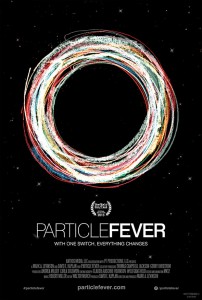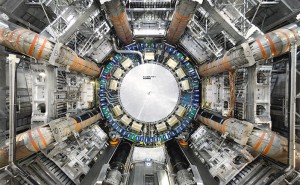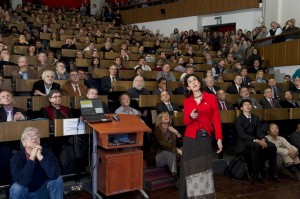 Particle Fever (Mark Levinson, USA, 2013, 99 min)
Particle Fever (Mark Levinson, USA, 2013, 99 min)
Wisconsin Film Festival, Saturday April 5 at 11:00am & Sunday April 6 at 3:15pm»
“Fever” is perfectly used in the title. From talking to the people in my life, who are not all scientists, I’ve learned that the Higgs Particle has been hot news since its proposed existence—it’s been called the “God Particle” after all. Finding this particle would mean a better understanding of the universe and now, with the development of the Large Hadron Collider (LHC), discovering the Higgs is possible. Particle Fever covers the last 10 years of the LHC project starting at the end of its construction, through the first trial, past various roadblocks and up to the latest, and biggest, discovery. This documentary adequately balances between catering to and challenging laypeople, like me, who desire to learn about the recent scientific breakthrough from physicists themselves. And physicists are unique people.
Showcasing a few specific characters, Particle Fever stresses a comparison between two groups of people: theorists and experimenters. David Kaplan is a goofy and likable theorist who has a contagious passion for his work and an excitement, though restrained, for the LHC project. Many of the theorists are similar, and are somewhat hesitant about the LHC—especially Savas Dimopoulos, who has seen failure before, and Nima Arkani-Hamed, who is just a bit negative and perhaps smug. The experimenters, on the other hand, bask in excitement and expectation of the LHC. Martin Aleksa and Monica Dunford  work together on the specific portion of LHC. Dunford is front and center throughout a lot of the documentary, probably because she effectively is able to describe complex science in simple terms. She kind of bugged me, perhaps because of the abundance of B-roll footage of her exercising. Then there is Fabiola Gianotti who holds a lot of power and coverage on the project. I was drawn to Gianotti because of her strong presence, obvious intelligence, and humility. These characters are interesting, and the physicists world is unusual—especially their parties. I would have like to see more of “Physicists Gone Wild.”
work together on the specific portion of LHC. Dunford is front and center throughout a lot of the documentary, probably because she effectively is able to describe complex science in simple terms. She kind of bugged me, perhaps because of the abundance of B-roll footage of her exercising. Then there is Fabiola Gianotti who holds a lot of power and coverage on the project. I was drawn to Gianotti because of her strong presence, obvious intelligence, and humility. These characters are interesting, and the physicists world is unusual—especially their parties. I would have like to see more of “Physicists Gone Wild.”
Not only does the film juxtapose theorists and experimenters, but it contrasts the differences between the young and the old in the field. The ones who have been in the field for 30 years are hesitant about the young’s high expectations and excitement. But the older ones have dedicated so much of their lives to a single pursuit, therefore they are more invested.
Particle Fever does touch on the controversies surrounding the Higgs particle and the LHC. I was pleased that Arkani-Hamed’s statements about the randomness of the universe were included, which no doubt will push the buttons of anyone who believes that there is any type of system or order in the world. The film doesn’t ignore the debate over the necessity of science and the justification for the billions of dollars spent, but it also doesn’t strongly take any sides either. It manages to only scratch the surface and this leads to a mild tone that seems inappropriate for such a relevant topic. By not diving deeper into the controversy, the questions remain potent in the viewer’s mind—“well, is this research worth billions of dollars?”
 Walter Murch (Apocalypse Now, Godfather) edited the film, and some of his work is definitely unique, borderline strange, yet surprisingly enjoyable. The prime example of this is the montage of Gianotti’s presentation at the end of the documentary. The drama throughout the film slowly builds to this moment where this huge finding will be announced. During the presentation, Gianotti’s voice is muffled, soft music begins, and dissolves connect shots of Gianotti speaking (inaudibly) and shots of the audience looking very interested as they nod along. I couldn’t tell if this scene was presented as a montage because the presentation was too long, or if the material was presumably over ordinary people’s heads. But the montage does end before the presentation is wrapped up and the audience gets to hear the essential point of the announcement (I wont give it away but it has to do with the Higgs particle).
Walter Murch (Apocalypse Now, Godfather) edited the film, and some of his work is definitely unique, borderline strange, yet surprisingly enjoyable. The prime example of this is the montage of Gianotti’s presentation at the end of the documentary. The drama throughout the film slowly builds to this moment where this huge finding will be announced. During the presentation, Gianotti’s voice is muffled, soft music begins, and dissolves connect shots of Gianotti speaking (inaudibly) and shots of the audience looking very interested as they nod along. I couldn’t tell if this scene was presented as a montage because the presentation was too long, or if the material was presumably over ordinary people’s heads. But the montage does end before the presentation is wrapped up and the audience gets to hear the essential point of the announcement (I wont give it away but it has to do with the Higgs particle).
After Gianotti’s presentation, and the latest news about the Higgs, the LHC has been shut down for 2 years, after which it will be reopened and more particle research will be conducted. Until then, Particle Fever gives us everyday people the fuel to argue and discuss what these findings might mean for the Universe.